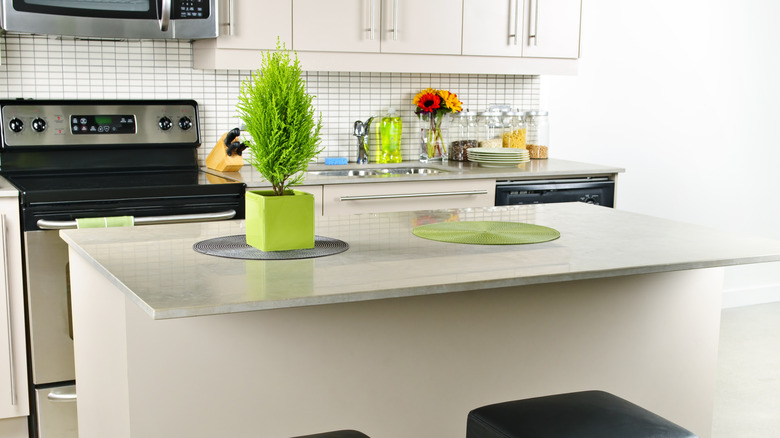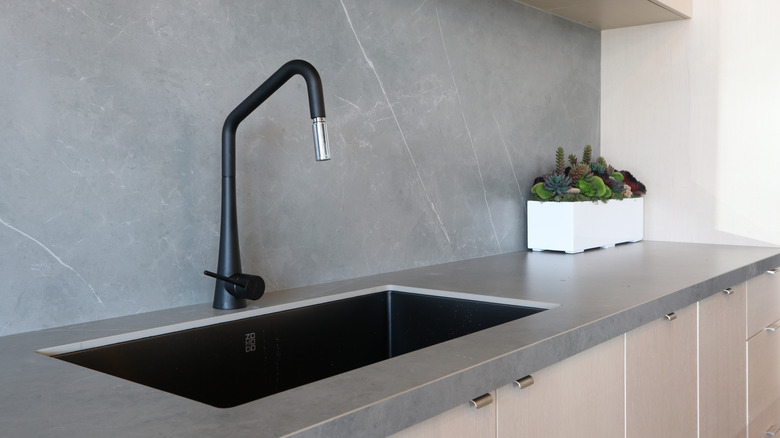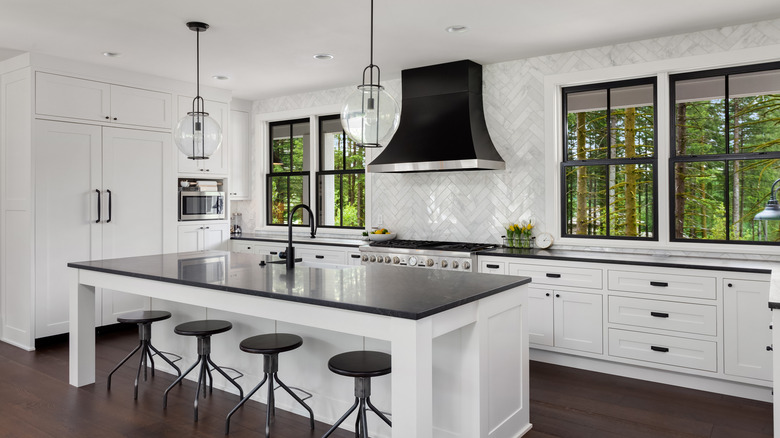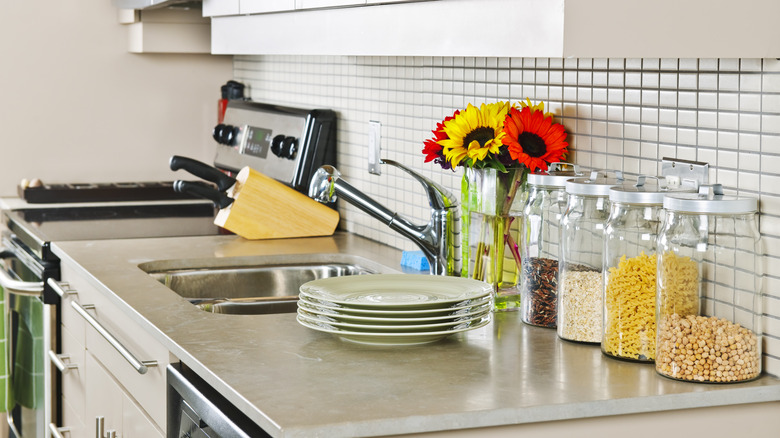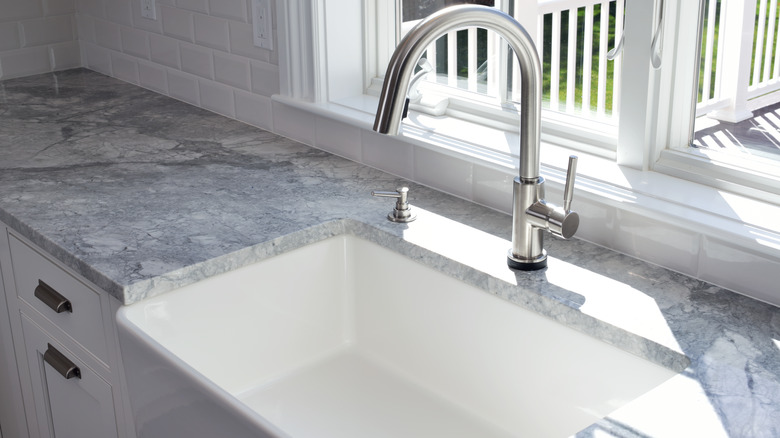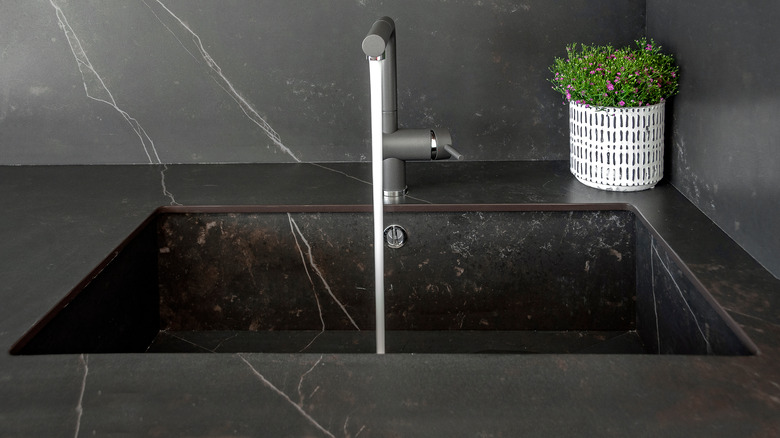Everything You Need To Know About Soapstone Countertops
There are plenty of options when it comes to countertop materials. From high-end options like marble or granite to the midrange options like ceramic. However, one countertop material that often flies under the radar is soapstone. Soapstone is a natural building material with uses extending far beyond countertops. It was historically used as a material for sculptures due to its soft nature. Although not quite as popular as other countertop materials, it is a good choice for an urban rustic appearance and will add character to your kitchen or bathroom.
Arch City Granite & Marble notes that soapstone is available in various colors and fits right into almost any kitchen style. If you are planning an upcoming renovation, soapstone makes a great choice, especially if you want something different to make your kitchen or bathroom stand out. Since soapstone is fairly uncommon to most homeowners, there are a lot of grey areas and misconceptions about its use as a countertop material. So, before deciding on soapstone for your new countertops, here is everything you need to know about it.
What is soapstone?
Soapstone is a naturally occurring material that is somewhat different from its counterparts. Unlike granite and marble which seems to be ideal for countertops, soapstone, on the other hand, can feel out of place. As mentioned, soapstone was initially popular for making sculptures but over time it has found its way into our homes as a versatile building material. The soft feel associated with soapstone is due to its main mineral component, which is better known as talc, explains Marble and Granite, Inc. All soapstone is not the same, however, and varies in terms of hardness depending on the amount of talc present.
According to M Teixeira Soapstone, the mineral composition of soapstone is determined by the Moh scale which ultimately determines how hard it is. Generally, soapstone with a mineral composition of 50% talc is hard enough to be used as a countertop or as floor tiles, while stone with less than 30% talc is reserved for sculpturing.
How much does soapstone cost?
While soapstone is ideal for anyone looking for an alternative to granite, marble, or quartz countertops, one unique factor about it is that it allows for DIY installation, saving you a significant amount on labor charges. If you are good with your hands or have a background in carpentry you should be able to install it yourself.
According to HPD Consult, the cost of soapstone per square foot ranges between $70 and $150 depending on the quality. Additionally, the cost of installation can vary is between $30 and $100. There are other additional cost factors other than installation and purchase of materials that you should be aware of. Add-ons like elaborate edge profiles will definitely increase the cost of the soapstone per square foot. Compared to other countertop materials, soapstone is a little more expensive, but when you factor in options for DIY installation, soapstone can be significantly cheaper.
Pros and Cons of soapstone
While some soapstone falls short when it comes to durability, it compensates in beauty and density. There are very few natural stone countertop options and soapstone is among the most beautiful thanks to its rich earthy tones. It is also quite sanitary because it is impervious to liquids and also bacteria-resistant, which means fewer health risks to your family. Other countertop materials like wood tend to be porous and are the perfect breeding ground for bacteria and mold. Although being softer than other countertops, soapstone is one of the best heat-resistant materials you can find, therefore, you don't have to worry about hot appliances destroying your beautiful surfaces.
One of the major points of contentions when it comes to soapstone countertops is the patina that develops over time if left unattended. While some homeowners love the dark hues it comes with, others cannot stand it. One way to ensure even aging is via oil treatments, suggests Garden State Soapstone. Another major drawback associated with soapstone countertops is possible chipping and cracking under a heavy load. You will need to be careful not to drop heavy cookware, lest you damage the surface.
Soapstone maintenance
Soapstone is among the easiest countertop materials as far as maintenance is concerned. Right after installation, you will need to wipe away any dust remnants and coat the entire surface with mineral oil. This will go a long way in speeding up the aging process and allow an even patina development. M Teixeira Soapstone recommends a subsequent application of organic oil once the previous coat starts to fade — how frequently you apply the oil will depend on how often you use your countertop.
Since soapstone is nonporous, you don't have to worry about the surface etching and staining because of acidic food spills like you would expect with marble. In addition, soapstone is heat resistant, so scorch marks should be the least of your worries as well. Don't shy off from scrubbing at food stains on your countertop either, you can trust that no harm will befall your beautiful countertop. If, after time, there is a blemish on the surface, reapplying a coat of oil should take care of the issue.
Should you install soapstone countertops?
Soapstone countertops are a great option for homeowners who want something out of the ordinary. Like a fine wine, their rustic appearance only gets better with age. Other than the aesthetic benefits, soapstone countertops have so much more to offer, from stain resistance, ease of maintenance, and the opportunity to install them yourself and save money. It is also worth mentioning that while the limitations are also real, proper maintenance and care practices will help you keep your countertop in tip-top shape for as long as possible.
International Stoneworks recommends simple care practices like having a cutting board instead of using the countertop to prevent chipping or leaving ugly cutting marks. Soapstone countertops are not exclusive to the kitchen alone, you also have the option of installing them in your bathroom. So, should you install soapstone countertops? Well, if you want your kitchen and bathrooms to have a unique style that adds personality to your home, then perhaps soapstone countertops are for you.
